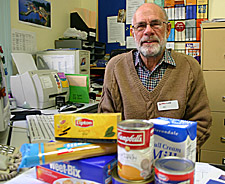 At a time in life when most people look forward to pottering in the garden or improving their golf game, retired pharmacist Jim Conolly is hoping to help heal Sydneysiders a world away from his North Shore home.
At a time in life when most people look forward to pottering in the garden or improving their golf game, retired pharmacist Jim Conolly is hoping to help heal Sydneysiders a world away from his North Shore home.
For the last 16 years this St Paul's Chatswood parishioner has been volunteering to help hundreds of vulnerable individuals and families in need of emergency support in Marrickville.
According to the 76 year old grandfather of seven, his work at an Anglicare centre, though challenging, keeps his mind active and helps him walk the Christian talk.
“I've always tried to do some sort of social work because I believe it is part of the Christian ethic,” Jim reflects.
“I often think of passages in Matthew 25 which have regularly challenged, rebuked and encouraged me.”
Every week the small emergency relief centre located near the heart of Marrickville sees close to 60 families desperately looking for support.
"There are a lot of people who struggle with poverty and a lot of things happen to them that are unfair. They get a pretty hard deal from others in society," Jim explains.
"We help provide financial assistance for people in need through food vouchers, phone, electricity and water bill payments. Sometimes we help with fares if people need to travel locally to job interviews. And it's always helpful that we have food in our cupboards to distribute when it's needed."
New poor to pressure welfare services
Despite 15 years of unprecedented economic growth, the 2006 Household, Income and Labour Dynamics in Australia (HILDA) Survey shows one in ten Australians earning significant incomes in 2001 had slipped to bottom half of the income distribution by 2003.
Jim, like many others, is expressing concern about the amount of people who could be forced to turn to services like Anglicare for help.
From 1 July 2006, changes to the federal government’s Welfare to Work program will see payment reductions for failing to meet welfare conditions will be replaced by a system of payment suspensions.
Welfare recipients now risk immediate eight week suspensions and complete payment cut-offs until they comply with a range of government requirements.
According to the National Welfare Rights Network, punishable offences include voluntarily leaving a job, being sacked for misconduct, refusing to accept a suitable job offer, and failing to complete an "approved program of work'.
Anglicare CEO Peter Kell has labelled ‘stripping all income from vulnerable unemployed people’ as morally unjustifiable.
“[Anglicare] would like to work with the Federal Government to develop a more just and equitable option to assist people who are unemployed or lose their jobs and face being breached,” he says.
"I think some politicians can be out of touch with people on the coal face. There are so many factors and reasons for breaches that are out of a person's control," Jim says.
"For example, if a person lives in a boarding house, receiving mail can be rather difficult as it can be regularly stolen or misplaced. It is incredibly easy for people not to receive any notifications until it is too late.”
Last year Anglicare Emergency Relief centres like the one Jim volunteers at assisted over 20,000 families in Sydney and Wollongong through generous community support.
He says his experience has taught him that there are far fewer ‘bludgers in the system’ than people might think.
"I don't think people understand that some in our community are dysfunctional for a reason,” he says.
“Some come from awful family backgrounds and never had that support. There are all sorts of reasons why they don't respond well.”
For more information about volunteering, contact Anglicare on (02) 9895 8000 or support volunteer work through the Anglicare web site.






















